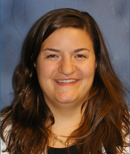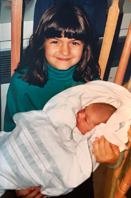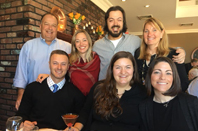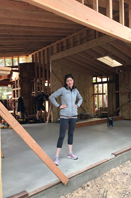Interview with Stephanie Conner, MD
A Conversation with Stephanie Conner, Assistant Clinical Professor
From where does your family originally hail? Where were you born and raised?
 My maiden name is McCarty, which is Irish, and I changed it to Conner, which is also Irish, two years ago when I married. My mother's family has been in the United States since the 1700s, the time of the Mayflower, according to Ancestry.com. My father's family is from Italy and my grandma was the first generation to be born here. Born and raised Long Island, New York, and I have three siblings. My older sister lives here and there are two younger brothers who are college-aged. I've lived most of my life on the East Coast until moving to California for college, returned to medical school in New York and residency at Yale, and now I am settled here.
My maiden name is McCarty, which is Irish, and I changed it to Conner, which is also Irish, two years ago when I married. My mother's family has been in the United States since the 1700s, the time of the Mayflower, according to Ancestry.com. My father's family is from Italy and my grandma was the first generation to be born here. Born and raised Long Island, New York, and I have three siblings. My older sister lives here and there are two younger brothers who are college-aged. I've lived most of my life on the East Coast until moving to California for college, returned to medical school in New York and residency at Yale, and now I am settled here.
Your alma mater is taking a beating in the news lately . . .
Yes, Yale is taking a beating in the news and appropriately so. Yale and New Haven were more progressive than I expected from an Ivy League institution and I loved being there, my professors, and my community, but there were clearly issues with racial and gender disparities. There have been reassuring changes to the culture of the institution now that will hopefully foster more equity and diversity.
Describe your family dynamic in an anecdote.
 When I was in high school, my brothers were around ten years old and both were mischievous. My job was to keep them from killing themselves or anyone else. One day I came home from school and found them in the backyard looking at me guiltily. On further investigation, they were practicing lighting things on fire and quickly putting the fires
When I was in high school, my brothers were around ten years old and both were mischievous. My job was to keep them from killing themselves or anyone else. One day I came home from school and found them in the backyard looking at me guiltily. On further investigation, they were practicing lighting things on fire and quickly putting the fires  out in the nick of time. In my best big sister voice, I said, "Give me that" and then redirected them toward another game that was a little bit safer. When our parents came home and asked what we'd been doing, we just shrugged and replied, "Not much." We had a lot of fun together but my strategy was always to keep them safe and avoid disaster.
out in the nick of time. In my best big sister voice, I said, "Give me that" and then redirected them toward another game that was a little bit safer. When our parents came home and asked what we'd been doing, we just shrugged and replied, "Not much." We had a lot of fun together but my strategy was always to keep them safe and avoid disaster.
What kind of kid were you? Did you always want to be a doctor?
I did always want to be a doctor but I'm not necessarily sure why. I am the only medical person in my family other than my aunt, who is a nurse. As a kid I liked medical shows like ER and my strengths in school were in math and the sciences. I took a different path for a while when I went to college at a liberal arts school and studied government and econ, but I didn't enjoy writing papers or the research questions. I wanted to be in the lab and around people. I volunteered in hospitals and realized that I wanted to be in Medicine with an interest in health policy.
Since you've been in the DHM, you seem to have hit the ground running. Is that your standard M.O.? When might you not approach things in high gear?
Yes, definitely. I am much more of a doer and been somebody who likes to hit the ground running. I am willing to try something, and then amending it, as opposed to thinking too much to the point where a plan doesn't get off the ground. I work best by learning by doing and doing iterations of a project. I am a compulsive planner, so while my actions may seem off the cuff they are generally very well thought out and prepared. I may not go into high gear when I feel out of my element or when I am unfamiliar with something, like when I was new to the DHM. Then, I had help and support, particularly from people like Trevor, who is a great mentor who helped guide and shape and focus my energies more specifically.
What was your most satisfying project this year? How did it fulfill you?
 Buying and remodeling a house. My wife and I joke that I am 110% FTE and 60% contractor because it really wasn't a sturdy house, in fact, I think it was originally a hunting cabin from the 1940s. We knocked most of it down and are literally rebuilding it. We are surrounded by trees: a giant redwood in back, eucalyptus in front, and a giant canopy above that lets in light. It is quiet and peaceful. I really enjoy all the elements involved in remodeling: the architectural design, interior design and even all the nuts and bolts. For example, when our contractor asked what kind of furnace I wanted, I had fun researching and learning about different brands of furnaces, their functionality, environmental impact. Professionally, I've learned so much about ultrasound and am excited to be with people who are engaged and hands on about bringing up our skill level in the division.
Buying and remodeling a house. My wife and I joke that I am 110% FTE and 60% contractor because it really wasn't a sturdy house, in fact, I think it was originally a hunting cabin from the 1940s. We knocked most of it down and are literally rebuilding it. We are surrounded by trees: a giant redwood in back, eucalyptus in front, and a giant canopy above that lets in light. It is quiet and peaceful. I really enjoy all the elements involved in remodeling: the architectural design, interior design and even all the nuts and bolts. For example, when our contractor asked what kind of furnace I wanted, I had fun researching and learning about different brands of furnaces, their functionality, environmental impact. Professionally, I've learned so much about ultrasound and am excited to be with people who are engaged and hands on about bringing up our skill level in the division.
What interests do you pursue outside of Medicine?
I get together occasionally with friends from my college softball team and we go to the batting cages for practice. And cooking, since my favorite room in our new house is the kitchen. It started out with some of the home delivery meal kits and I've taken some cooking classes, like knife skills, and I try to keep learning by following recipes. I talk with my grandmother a lot and am trying to get some of her Italian recipes for Bolognese sauce and Meatballs with Rigatoni, dinners from my childhood. We've experimented with Asian cuisine, too. Most of my cooking utensils are in storage until we finish the house, but we're hoping to be fully moved in by Thanksgiving. I don't know that I have sophisticated enough of a palate to be a foodie, but I love cooking and entertaining so I really want to have people over, maybe for Sunday dinners.
How much of a baseball fan are you? Were you happy with the MLB Wild Card game between the Oakland A's and the New York Yankees?
I grew up playing sports, primarily softball, since I was three years old, and my brothers played baseball, too, so we grew up on a field. I've been a Yankees fan for my entire life and am always excited to see them in the playoffs.
Are television medical shows relevant or even interesting? How do you feel about physicians as portrayed?
My favorite medical show and, I think the most accurate, is Scrubs. It was funny but not too ridiculous about medical diagnoses and was kind in its depiction of physicians. It bothers me that the new shows are about one individual against a whole system that doesn't care about patients. It's unfortunate that the perception is that doctors are rolling around in millions on the backs of patients who can't afford medical care. It's not accurate, it's not true, and it's not a healthy relationship being propagated in pop culture: that your doctor isn't the one who has your back, that it's always someone else advocating for patients, like nurses or other groups. Two years ago, I helped my parents navigate a health scare and I heard their frustrations about dealing with their physicians and "the system." The medical system has become just too hard for people to navigate easily and they, in turn, blame their physicians. It's hard to encapsulate that in a one-hour TV show.
What characteristics do your loved ones admire about you? And what quirk(s) may drive them just the teensiest bit nuts?
What I've heard all through my life is that I am very reliable and dependable. If I say that I will do something, I will, and if something needs to be figured out, I will be the person to turn it into action. I balance that priority-driven aspect with being funny and bringing lightness to situations, I love to make people laugh. One of my quirks is that, in my journey to figure something out, I can be perseverative and look at every conceivable angle over and over…at least that's what my wife tells me!
What is your biggest concern about how women are portrayed in our lifetime?
Although it feels as though we are making progress on any number of levels, sometimes I worry that we are not. I was raised by two working parents who consistently demonstrated that my mom and my dad were equals, that being a woman and a man did not mean that there was a power differential. That ideal was supported by female teachers in school and female professors in college who were every bit as capable, if not more, as what men were capable of. It is sometimes disheartening to see how women are portrayed in media, particularly in the past couple of years and especially recently, but my hope—and I am optimistic—is that sometimes things have to hit bottom before people wake up and create a groundswell of change.
To what are you hopeless addicted?
HGTV! It's always on and I don't even have a favorite (okay, maybe Fixer-Upper), but it's the whole DIY thing. It's always on in the background in my spare time. It's my gateway drug to the magazines I now get, the apps for interior design, and Netflix DIY shows. My wife asked what I am going to do when the house is finished and I responded, "landscaping the yard."
- by Oralia Schatzman
View Stephanie's professional bio | Go back to interviews
